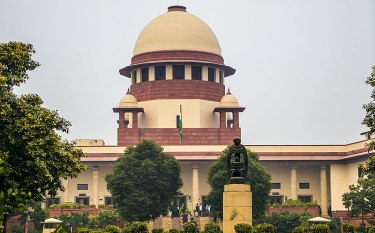
The Supreme Court has delivered a scathing judgment against the Uttar Pradesh Police, quashing criminal proceedings under the UP Gangsters and Anti-Social Activities (Prevention) Act, 1986, against Vinod Bihari Lal, Director of Sam Higginbottom University of Agriculture, Technology and Sciences (SHUATS), Prayagraj.
A bench comprising Justices J.B. Pardiwala and Manoj Misra criticised the police’s “casual” and “cavalier” handling of citizens’ rights, declaring the FIR and subsequent proceedings “nothing but an abuse of the process of law.”
Gang chart “rubber-stamped” without application of mind
The court found that the authorities mechanically approved a gang chart without adhering to the mandatory procedural safeguards under the Gangster Act. Justice Pardiwala, writing for the bench, observed that the gang chart was “approved by the competent authority merely by affixing his signature on a pre-printed gang-chart, an act that reflects nothing short of a complete non-application of mind.”
The bench noted: “Resultantly, the registration of the subject FIR is in complete violation of the procedural safeguards. We are at pains to observe that authorities, entrusted with the solemn duty of safeguarding life and liberty, treat it with such casual indifference—truly a case of the fox guarding the henhouse.”
Background of the case
The case arose from FIR No. 850 of 2018 registered at Naini Police Station, which alleged that Lal and one David Dutta formed a gang to commit economic offences involving fraud and cheating. The FIR was based on five earlier cases from 2017, which accused them of misusing approximately ₹34.5 crore received from foreign sources to fund illegal religious conversions.
SHUATS, established in 1910 as the Allahabad Agricultural Institute, is a leading Christian minority institution that became a state university in 2016. It offers programmes across agriculture, engineering, sciences, and other disciplines, with over 10,000 students currently enrolled.
Flawed investigation exposed
The Supreme Court highlighted glaring deficiencies in the police investigation. The chargesheet filed against Lal contained no annexures or documentary evidence, and merely reproduced the original FIR’s contents.
“The contents of the chargesheet reflect a casual and cavalier attitude on the part of the investigating agency, as it discloses nothing beyond what was already stated in the subject FIR,” the court observed.
Most critically, the investigating officers claimed that the offence was “proved” without offering any substantiating evidence. The court strongly disapproved of this practice, reiterating that:
“The role of investigating agencies is strictly circumscribed to conducting an impartial investigation into the alleged crime; the guilt or the innocence of the accused is for the trial court to determine.”
Procedural violations highlighted

The judgment revealed multiple violations of the UP Gangster Rules, 2021. The court found no evidence of the mandatory joint meeting between the District Magistrate, Commissioner of Police, and Senior Superintendent of Police prior to the gang chart’s approval.
Senior Advocate Siddharth Dave, appearing for Lal, highlighted that co-accused David Dutta was not named in most of the base FIRs, raising serious questions about the gang chart’s validity. The court described this “selective approach” as raising “serious doubts about the bona fides of the investigating agency.”
State’s response and court’s findings
Additional Advocate General Garima Prashad, representing the state of Uttar Pradesh, argued that the FIR disclosed cognisable offences and pointed to 32 pending criminal cases against Lal. However, the court rejected this argument, citing the Mohammad Wajid precedent, which held that criminal antecedents alone cannot justify refusing to quash proceedings when no genuine offence is disclosed.
The Allahabad High Court had earlier rejected Lal’s applications twice, stating that violence was not essential under the Gangster Act and that the gang chart reflected proper application of mind. The Supreme Court overturned those findings.
Guidelines adopted for future cases
The court also adopted and enforced guidelines previously framed by the UP government following its earlier directions in the Gorakh Nath Mishra case. These include mandatory joint meetings for gang chart approval, written satisfaction by competent authorities, and a ban on the use of pre-printed gang charts.
The court directed the authorities to “adhere to the aforementioned guidelines and comply with the Checklist, in both letter and spirit.”
Relief for university leadership
The judgment brings significant relief to the leadership of SHUATS, which has faced sustained legal challenges. Up to the end of 2023, nearly 27 cases had been registered against Director Vinod Bihari Lal, based on complaints from individuals including local BJP leaders in Prayagraj, Lucknow, Fatehpur, and Pratapgarh districts.
SHUATS Vice-Chancellor Rajendra Bihari Lal has also faced multiple legal challenges, including his arrest in January 2024 following a new case filed at Naini Police Station. The case included charges such as attempted murder, based on a complaint by Diwakar Nath Tripathi, a former BJP leader. The Supreme Court has granted him interim protection from arrest in cases related to alleged forceful religious conversion, including one filed by Saroj Kumari under the UP Prohibition of Unlawful Conversion of Religion Act, 2021. However, the apex court has also quashed certain cases against him, including one involving alleged forgery of Bishop Johnson School affiliation documents, noting that the allegations were made with “malafide intent.”
The court clarified that its observations apply only to the Gangster Act case and do not affect other pending proceedings against the university officials.




